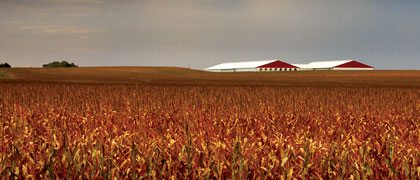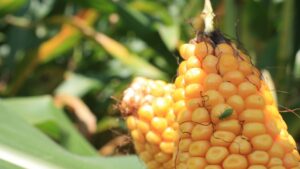A Systems Approach to Corn and Soybeans
Seed companies are changing the way they sell seed–because there’s more to farmers’ success than great genetics.
Large seed companies are taking a page out of the smaller guys’ book as they become much more invested in their customers’ operations, developing programs and initiatives designed to provide agronomy and stewardship advice as an added benefit to their products.
“One of the biggest trends is focusing more on a systems approach,” says John Chambers, corn technology lead at Monsanto Company. “The biotech traits are certainly important as a foundation, but it’s also having excellent genetics, breeding traits, chemistry solutions, seed treatments as well as the agronomic practices that go together to form a system to help farmers be successful.”
Monsanto’s Integrated Farming Systems (IFS) platform is designed to help farmers get more from every acre by integrating the company’s expertise in seed and field science with data analysis and precision equipment. “The IFS is where we’re taking a look at a specific farmer’s field and the characteristics of that field,” says Chambers. “We take that information and match it up with data we have on our individual hybrids about how they perform in different environments, so we can provide the farmer with better recommendations for hybrid selection, as well as management.”
“A few years ago we integrated our crop protection and seed businesses because we saw this was the way of the future for agriculture, and that the agronomy and the interfaces between different technologies was going to be critical.”
|
The first product from the IFS platform is FieldScripts for corn, which was part of the company’s 2013 Ground Breakers, a program that involves farmers in on-farm testing of new technologies prior to their commercialization.
FieldScripts was tested by 150 farmers across Illinois, Indiana, Iowa and Minnesota in 2013. They provided two to three years of historical yield and soil test data that was combined with many layers of information from Monsanto about its corn hybrid performance. The combined data was used to develop individualized hybrid corn recommendations and variable rate seeding prescriptions for each field. The process was offered through DEKALB dealers and delivered via an app on the farmer’s iPad. Farmers will be able to purchase the FieldScripts system in 2014. An IFS program is being developed for soybeans as well.
Other large seed companies have similar programs. Bayer CropScience pioneered a program called Respect the Rotation, an initiative to promote herbicide diversity, as well as reinforce the principles of integrated weed management through rotation of crops, herbicide-tolerant traits, and using multiple modes of action.
DuPont Pioneer’s IMPACT program focuses on providing localized solutions to growers. With so many products and options available in today’s marketplace thanks to improved breeding and technology innovations, growers are much more likely to demand data about how those products will perform under local conditions on their farm. Local testing to help growers match the right product to the right acre is the rationale behind IMPACT (Intensively Managed Product Advancement, Characterization and Training). Participating farm customers allow pre-commercial trials of new DuPont Pioneer hybrids in their fields before they are commercially launched.
“We’re testing and developing those products locally and when we do that we understand the best management practices for those in our customers’ specific environments,” says Reed Mayberry, DuPont Pioneer’s senior corn marketing manager. “Through IMPACT testing and using DuPont’s agronomy sciences, we can say to our customers that we’ve been literally right down the road testing these products. We know the right population, the timing, the row spacing, and we can put all those pieces together and increase profitability on the farm with Pioneer products. That’s a pretty powerful tool.”
A whole system’s approach has been Syngenta’s strategy for several years, says Ross Weikel, Syngenta’s head of soybeans in North America. “A few years ago we integrated our crop protection and seed businesses because we saw this was the way of the future for agriculture, and that the agronomy and the interfaces between different technologies was going to be critical. It was important for us to look at third-party technologies and integrate those into what we were doing and not take a product-focused view of the world. To help growers get to the next level of productivity, we are going to have to look at how our products work as part of the whole system.”
An example is a program Syngenta initiated in the western U.S. Corn Belt three years ago which has drastically helped farmers reduce irrigation water use. “It’s a holistic approach and involves Syngenta, irrigation manufacturers and agricultural retailers, and together we have created a system that has a meaningful impact on growers’ ability to produce the same amount of corn with 25 percent less water,” says Pat Steiner, Syngenta’s corn portfolio head.
The company has also developed corn rootworm management recommendations to help growers take a broader approach to managing rootworm in their fields. “Corn rootworm is a situation to be managed, it’s not a problem to be solved, and it requires a whole-farm look,” says Jill Wheeler, Syngenta product lead, commercial traits. “Growers have to look at everything they are growing and how they are rotating their fields and what they are using on those fields each year. We have been promoting a broad-based management approach.”
Collaboration Required
Taking a whole systems approach to address the complex needs of corn and soybean growers has necessitated more collaboration and cross-licensing between various companies of traits and technologies. That’s providing more flexibility and options than ever before and is, in the end, better serving growers’ needs, says Tony White, product development manager, soybean systems for Monsanto. “It comes down to what the growers are looking for, and if there’s value in other companies carrying a trait, then that’s probably something we should continue to strive for, and that’s the direction we’re taking at this point in time,” he says.
The multiple traits, genetics, chemistries and technologies available in corn and soybeans today have also meant that smaller, independent seed companies have more of an edge than they used to have, says Tim Welbanks, lead agronomist at Maizex Seeds. “Having access to all the preferred traits and technologies has put us in an attractive position because we’ve got a broader offering with really good genetics,” says Welbanks. “We’re able to sub-license and have that access versus when you’re in a brand, you are stuck with what you’ve got access to. A small company that’s nimble, like we are, can roll that out and provide more options to our customers to improve their profitability.”
With such a wide array of available products comes a certain amount of confusion, so growers are increasingly turning to seed companies for the information they need to make informed decisions about which products best fit their needs. “We sort through some of the confusion for our customers,” says Randy Wilken, president of ProHarvest Seeds in Ashkum, Ill., an independent seed company that’s been in business for over 50 years. A big part of the company’s role these days is advising customers not just about specific products, but also about proper stewardship of them.
“These products have provided a huge value in terms of weed control and insect control since their introduction, and now we’re starting to learn how to be vigilant in using all those technologies so we don’t lose them,” he says.
Angela Lovell












